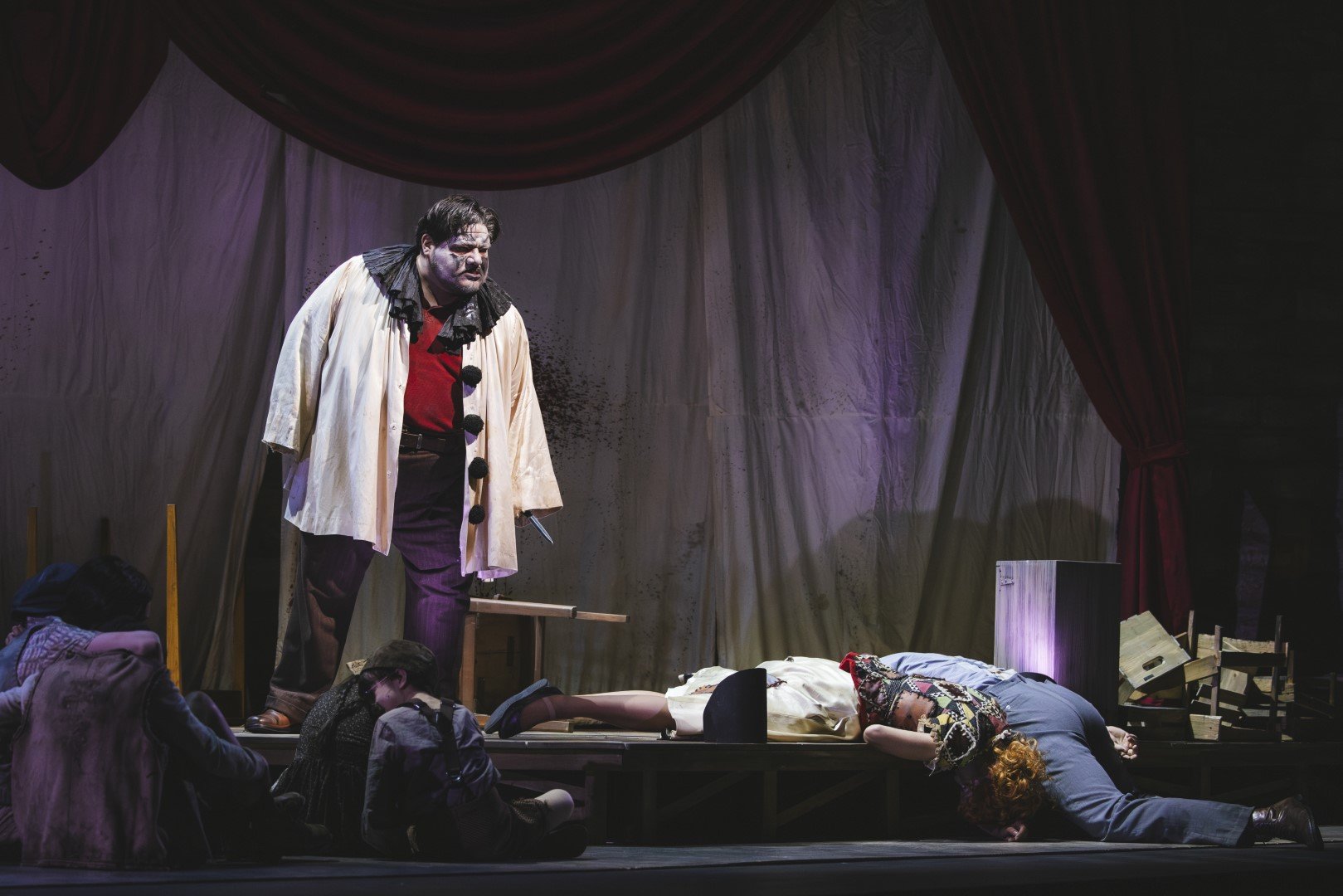Seattle Opera Opens New Season with a Powerful 'Pagliacci'
/By Truman C. Wang
8/5/2024
Photo credit: Seattle Opera
The last time Paglacci was seen on Seattle’s McCaw Hall stage was sixteen years ago, in 2008, when it was presented as a standalone production, not part of a usual double-bill. According to the departing General Manager Christina Scheppelmann, “The dramatic irony is felt more intensely and the music really has a chance to shine, making for a potent evening of theater.”
Potent, indeed, is the production directed by Dan Wallace Miller (shared with Kansas City Opera). The setting was moved to 1950’s Italy, a country ravaged by World War II, its people faced with grim realities. They go to a comedy show to escape; little did they realize they were about to witness a domestic tragedy unfolding in front of their eyes, a case of art imitates life. Nedda, fed up with her husband Canio’s abuse and alcoholism, resolves to get away from him with her lover Silvio. Canio, as directed by Miller, is not deformed or misshapen; he does not sob over a broken heart or put on clown makeup during his big aria; he looks menacing and evil in harsh overhead lighting – a completely unsympathetic figure. The attractive scenery, by Steve C. Kemp, features a small Italian village piazza with long steps in the center, flanked by a private apartment on the left and a towering church on the right; the comedy show stage (scene of the crime) is mounted directly in front of the church (oh the irony!) Abigail Hoke-Brady’s lighting floods the sun-kissed Italian scenery in a golden glow, completing the beautiful stage picture. Cynthia Savage’s gorgeous, fanciful commedia dell’arte costumes for the comedy troupe contrast sharply with the drab villagers carrying on their daily grind.
The powerhouse cast of singing actors was led by Diego Torre, the Canio, a lyric tenor with a ringing and forceful tone in the aria “Vesti la giubba”, and in the commedia dell’arte play within-the-opera when Canio breaks through from artifice to reality. Michael Chioldi, as Tonio (the other scary clown), portrayed the malevolent role with chilling power; he closed the prologue with a thrilling A-flat and G-natural call of “let the show begin!” In her role and U.S. debut, Cuban soprano Monica Conesa is a convincingly free-spirited and impulsive Nedda who attacks the role with fierce passion. I heard some audience members comparing Conesa with Maria Callas; there are indeed similarities, and not all are good – the slow wobble, the dark covered tone, the uneasy coloratura in Nedda’s aria “Stridono lassu” (The original Nedda, Adelina Stehle, was a light coloratura-soprano) – all troubling signs for a young singer in her twenties. Michael J. Hawk is Nedda’s lover Silvio with a pleasing lyric baritone voice. John Marzano also made a strong impression as sweet-toned Beppe/Arlecchino.
The Seattle Opera Chorus, 36 strong, and the 16-member youth chorus did an admirable job of singing, jumping, romping around as the villagers excited to see a new comedy show. Italian conductor Carlo Montanaro was superb, drawing rich and detailed sounds from the Seattle Symphony in the pit – the string filigree of Nedda’s aria; the long pause and cello singing a melancholy melody of deep yearning in the Tristanesque love duet; the burnished lower strings in act two prelude that recalls Hans Sachs profound depression in Wagner’s comedy, and heralds the impending tragedy in Pagliacci. The immensely satisfying orchestral playing alternated between comedy and tragedy, grand passion and deep pain. Italian opera just doesn’t get better than this.
Fun facts:
Pagliacci Pizza, a Seattle-area pizza chain, is a sponsor.
Canio sings the final line.”La commedia è finita!” in this production, whereas Tonio sang it in 2008.
The Friday, August 16 show is “Pay What You Wish”. Other dates are August 10, 11, 14, 17
Truman C. Wang is Editor-in-Chief of Classical Voice, whose articles have appeared in the Pasadena Star-News, San Gabriel Valley Tribune, other Southern California publications, as well as the Hawaiian Chinese Daily. He studied Integrative Biology and Music at U.C. Berkeley.



















